Film at eleven.
Monday, November 28, 2011
Sunday, November 20, 2011
Thursday, November 17, 2011
Steek Geek
The lopapeysa chugged one station closer to Finishville yesterday, after I cut the steek down the front. Snippity-snip. Instant cardigan.
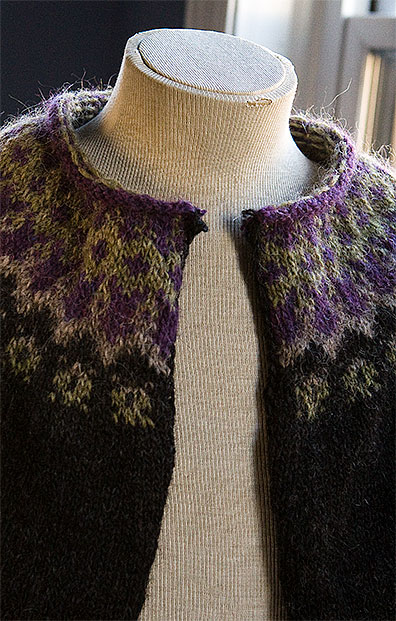
This isn't my first steek, but it's the first time I've secured the edges using a sewing machine instead of rows of crochet. I chose the sewing option because it was for me the less familiar and the more unnerving. Like that nice Mae West, when choosing between two evils I always pick the one I haven't tried yet.
I've only recently started to make friends with my sewing machine. There are still awkward moments, when I'm not sure of myself and she just sits there waiting for me to make a move. We have navigated successfully through a couple of hems, a square pillow and the lower portion of a doll; but never had I run a length of hand-knitting between the presser foot and the feed dogs.
A test drive was in order. I whipped out a swatch* that transitioned (like the lopapeysa) from one color to two. This took ten minutes, and probably saved me an hour's trouble in the long run.
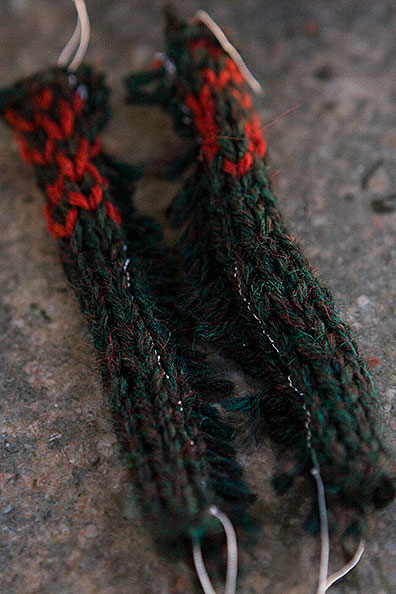
I used the swatch to determine the top tension setting, the stitch length, and the amount of effort I'd need (not much, it turned out) to keep the fabric sliding along the machine bed.
This is not to say there were no bumps. Some knitters like to preserve the illusion of infallibility, but I blew that opportunity years ago. I might as well 'fess up.
The first pass–done with the wrong side of the fabric up, which I'd been told would help me stay on track–was a disaster. It wiggled like an EKG for the first eleven inches, then ran off the steek and and landed in the yoke pattern.
Notice, however, that I am still here, alive, typing this. Notice that the sweater was not wrecked. Notice that the police blotter in the Chicago Sun-Times did not report a man hurling a sewing machine out the living room window and into Lake Michigan.
I learned what happens when (horrors!) your sewn steek goes astray. What happens is you get your seam ripper and you un-pick the stitches. I decided to undo the entire twenty-inch seam. It took thirty minutes. I watched half an episode of Monarch of the Glen while I was doing it. There are worse ways to pass time.
The second and third passes (with the right side up) were uneventful, and whatever jitters attended my maiden voyage with this technique will bother me no more.
Before starting the sleeves, I decided to run a row of single crochet up each selvedge.
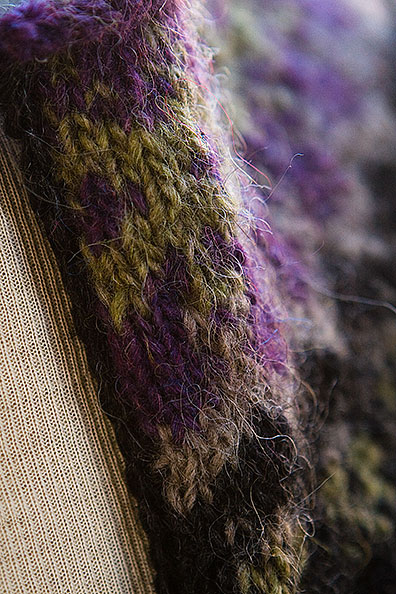
I'm so happy I did. The edges have more body, look spiffy, and will provide a more stable base for the zipper.
Sleeves are next. I know I can do sleeves.
*I felt compelled to post a photograph of the swatch to prove that I had done it. I think not swatching and saying you did is one of the dirty little secrets of knitting. It's like flossing your teeth. Maybe you do, maybe you don't; but either way you're going to give the dentist the same answer–which is never "Oh, frankly, I just couldn't be bothered."

This isn't my first steek, but it's the first time I've secured the edges using a sewing machine instead of rows of crochet. I chose the sewing option because it was for me the less familiar and the more unnerving. Like that nice Mae West, when choosing between two evils I always pick the one I haven't tried yet.
I've only recently started to make friends with my sewing machine. There are still awkward moments, when I'm not sure of myself and she just sits there waiting for me to make a move. We have navigated successfully through a couple of hems, a square pillow and the lower portion of a doll; but never had I run a length of hand-knitting between the presser foot and the feed dogs.
A test drive was in order. I whipped out a swatch* that transitioned (like the lopapeysa) from one color to two. This took ten minutes, and probably saved me an hour's trouble in the long run.

I used the swatch to determine the top tension setting, the stitch length, and the amount of effort I'd need (not much, it turned out) to keep the fabric sliding along the machine bed.
This is not to say there were no bumps. Some knitters like to preserve the illusion of infallibility, but I blew that opportunity years ago. I might as well 'fess up.
The first pass–done with the wrong side of the fabric up, which I'd been told would help me stay on track–was a disaster. It wiggled like an EKG for the first eleven inches, then ran off the steek and and landed in the yoke pattern.
Notice, however, that I am still here, alive, typing this. Notice that the sweater was not wrecked. Notice that the police blotter in the Chicago Sun-Times did not report a man hurling a sewing machine out the living room window and into Lake Michigan.
I learned what happens when (horrors!) your sewn steek goes astray. What happens is you get your seam ripper and you un-pick the stitches. I decided to undo the entire twenty-inch seam. It took thirty minutes. I watched half an episode of Monarch of the Glen while I was doing it. There are worse ways to pass time.
The second and third passes (with the right side up) were uneventful, and whatever jitters attended my maiden voyage with this technique will bother me no more.
Before starting the sleeves, I decided to run a row of single crochet up each selvedge.

I'm so happy I did. The edges have more body, look spiffy, and will provide a more stable base for the zipper.
Sleeves are next. I know I can do sleeves.
*I felt compelled to post a photograph of the swatch to prove that I had done it. I think not swatching and saying you did is one of the dirty little secrets of knitting. It's like flossing your teeth. Maybe you do, maybe you don't; but either way you're going to give the dentist the same answer–which is never "Oh, frankly, I just couldn't be bothered."
Monday, November 14, 2011
The Transformation of the Bunny Rabbit
Did you ever have one of those days when you woke up and knew with fearful certainty that absolutely nothing else would be accomplished until you had knit yourself an extremely tiny specimen of Oryctolagus cuniculus?
Fortunately, in preparing Teeny-Tiny Mochimochi, Anna Hrachovec (the benevolent queen of mochimochiland.com) had anticipated this eventuality and provided a pattern. It took about thirty minutes scratch to my itch.
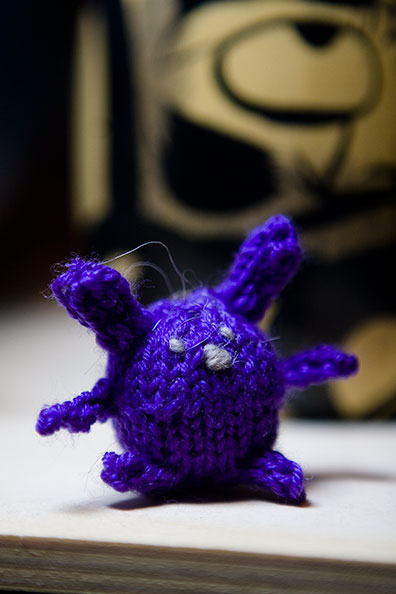
Cute, right? Yes. But...pedestrian. Unremarkable.
The eyes had to go. Too predictable. Bigger. Brighter. Caffeinated.
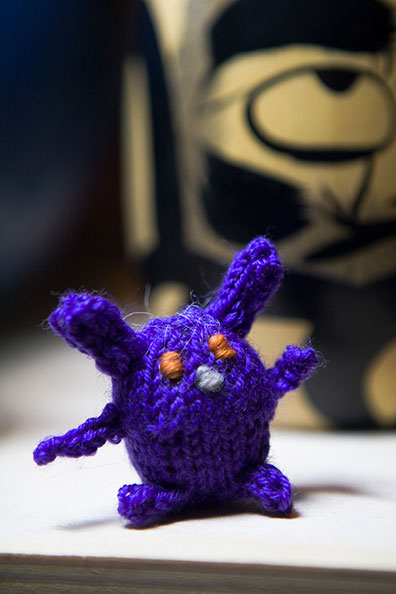
Better.
Then, a haircut that didn't look like a haircut. Something tousled and shaggy, probably unwashed, maybe styled with an ironic nod to the 1970s and The Doobie Brothers but decidedly modern in color.
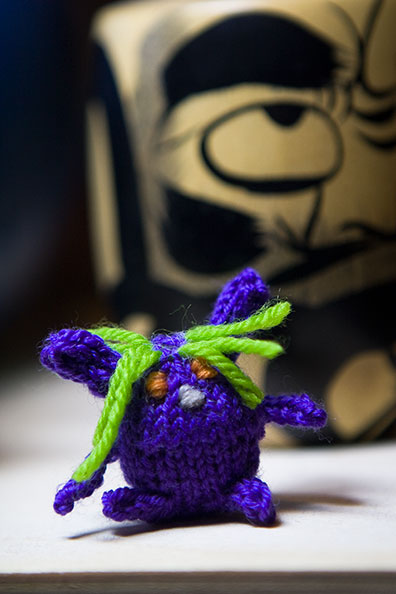
And a piercing, of course.
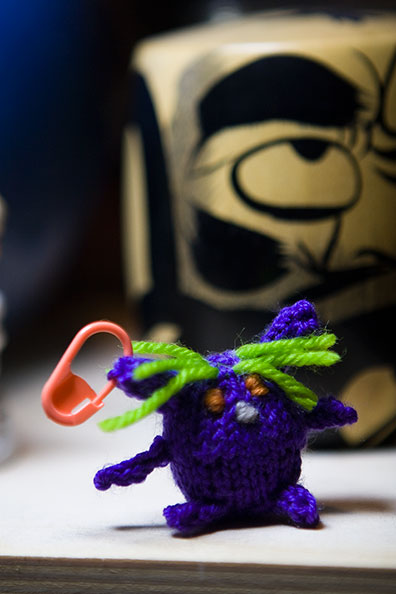
I was going to complete the makeover by knitting the bunny an extremely small Death Cab for Cutie t-shirt, but he had decided this post was So Over.
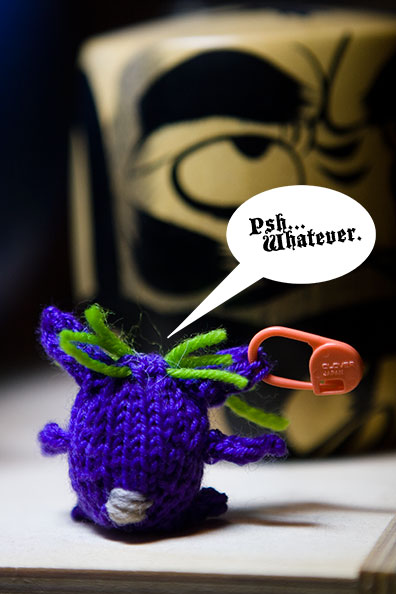
Fortunately, in preparing Teeny-Tiny Mochimochi, Anna Hrachovec (the benevolent queen of mochimochiland.com) had anticipated this eventuality and provided a pattern. It took about thirty minutes scratch to my itch.

Cute, right? Yes. But...pedestrian. Unremarkable.
The eyes had to go. Too predictable. Bigger. Brighter. Caffeinated.

Better.
Then, a haircut that didn't look like a haircut. Something tousled and shaggy, probably unwashed, maybe styled with an ironic nod to the 1970s and The Doobie Brothers but decidedly modern in color.

And a piercing, of course.

I was going to complete the makeover by knitting the bunny an extremely small Death Cab for Cutie t-shirt, but he had decided this post was So Over.

Tuesday, November 08, 2011
Casting On
Possibly because she's had enough of waiting for her Pink Cape,* and has decided to just do it herself, Abigail (who is pushing five, can you believe it?) asked my sister to show her the ropes. Or yarns, as it were.
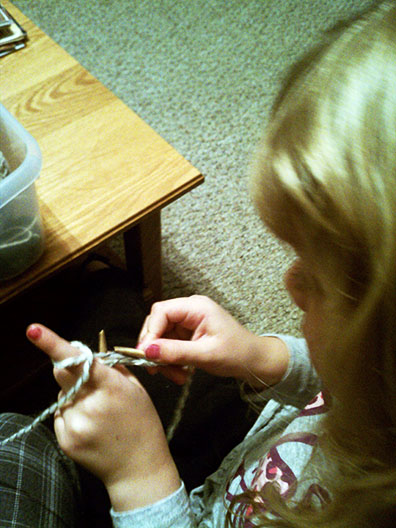
In her message to me, Susan noted that I should not give the impression that my niece will now be augmenting the family income as a stocking knitter, like those kiddies of old you hear about who were turning heels at age three. She enjoyed herself, and began to get the gist of it all. But she was mightily distracted the entire time by the basket of yarn on the table. She kept wanting to stop knitting so she could pet and squeeze it.
Sounds like a Knitter to me.
*I'm at the bottom, about eight rounds from the end. Stop shovin'.

In her message to me, Susan noted that I should not give the impression that my niece will now be augmenting the family income as a stocking knitter, like those kiddies of old you hear about who were turning heels at age three. She enjoyed herself, and began to get the gist of it all. But she was mightily distracted the entire time by the basket of yarn on the table. She kept wanting to stop knitting so she could pet and squeeze it.
Sounds like a Knitter to me.
*I'm at the bottom, about eight rounds from the end. Stop shovin'.
Wednesday, November 02, 2011
Little Man, Big Sweater
The lopapeysa isn't the only thing I've been knitting, but it's the one thing I can show you.
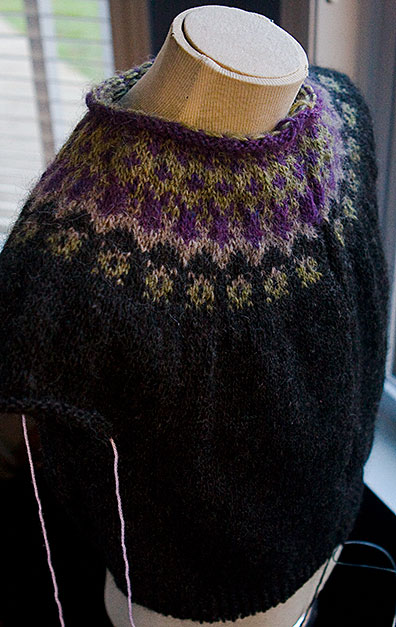
Having now shown it, I will confess that almost everything you see below the yoke has been ripped back and is being re-knit.
One of the great advantages of working from the top down is that the sweater can be tried on while still in progress, without any danger of this happening. For interim fittings to be of genuine benefit, however, the knitter must be able to make honest assessments of his work and correct as needed. I, perhaps due to an excess of enthusiasm, was unable to face facts until I'd nearly completed the ribbing at the hem. Denial, as I was saying to Kevin Spacey and Ryan Seacrest the other day, is a powerful thing.
The problem? The front was fine, but the back had enough extra room to park a couple of minivans, one of them pulling a trailer. It looked like that flap of skin mother dogs use to carry puppies around. This, in spite of my attempts to head off exactly such an outcome by dividing the work at the underarms with considerably more stitches in front than in back.
Man knits; God laughs.
It's startling for a guy to become a knitter, take stock of his measurements and realize that he requires what his dressmaker grandmother taught him is called a Full Bust Adjustment. Even if it does indicate that all those bloody bench presses haven't been for naught.
In a ready-t0-wear sweater, I might have let it pass. I'm accustomed to store-bought clothes not fitting properly. Commercial menswear lines consider stocky fellows under five feet, seven inches to be flights of fantasy, like the Loch Ness Monster or Mitt Romney's moral compass.
But there's no such excuse when I'm making it with my own hands. Rip I must, and rip I did; and the results will be worth it in the end.
I can't sign off before drawing your attention to the length of insipid pink yarn that's holding the live armhole stitches–you can see the ends hanging down. It came from a gigantic ball of shoddy acrylic I picked up years ago, when I still believed that yarn was yarn was yarn. I made three baby gifts from it, taught myself lace by using it for swatches, and have sliced off what must be miles of it in bits and pieces to use for class demonstrations, provisional cast-ons, stitch holders, and stitch markers.
The ball is still exactly the same size it was when I bought it. When Bill Clinton was in the White House.
This never happens with cashmere.
New York Calling
Online registration is open for my early December classes at Lion Brand Yarn Studio in New York City. This will be a first visit for me, and they'll also be hosting a talk/book signing the same weekend. The place is a kick–come and join us.

Having now shown it, I will confess that almost everything you see below the yoke has been ripped back and is being re-knit.
One of the great advantages of working from the top down is that the sweater can be tried on while still in progress, without any danger of this happening. For interim fittings to be of genuine benefit, however, the knitter must be able to make honest assessments of his work and correct as needed. I, perhaps due to an excess of enthusiasm, was unable to face facts until I'd nearly completed the ribbing at the hem. Denial, as I was saying to Kevin Spacey and Ryan Seacrest the other day, is a powerful thing.
The problem? The front was fine, but the back had enough extra room to park a couple of minivans, one of them pulling a trailer. It looked like that flap of skin mother dogs use to carry puppies around. This, in spite of my attempts to head off exactly such an outcome by dividing the work at the underarms with considerably more stitches in front than in back.
Man knits; God laughs.
It's startling for a guy to become a knitter, take stock of his measurements and realize that he requires what his dressmaker grandmother taught him is called a Full Bust Adjustment. Even if it does indicate that all those bloody bench presses haven't been for naught.
In a ready-t0-wear sweater, I might have let it pass. I'm accustomed to store-bought clothes not fitting properly. Commercial menswear lines consider stocky fellows under five feet, seven inches to be flights of fantasy, like the Loch Ness Monster or Mitt Romney's moral compass.
But there's no such excuse when I'm making it with my own hands. Rip I must, and rip I did; and the results will be worth it in the end.
I can't sign off before drawing your attention to the length of insipid pink yarn that's holding the live armhole stitches–you can see the ends hanging down. It came from a gigantic ball of shoddy acrylic I picked up years ago, when I still believed that yarn was yarn was yarn. I made three baby gifts from it, taught myself lace by using it for swatches, and have sliced off what must be miles of it in bits and pieces to use for class demonstrations, provisional cast-ons, stitch holders, and stitch markers.
The ball is still exactly the same size it was when I bought it. When Bill Clinton was in the White House.
This never happens with cashmere.
New York Calling
Online registration is open for my early December classes at Lion Brand Yarn Studio in New York City. This will be a first visit for me, and they'll also be hosting a talk/book signing the same weekend. The place is a kick–come and join us.
